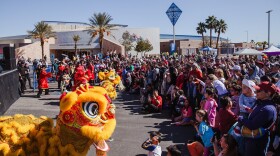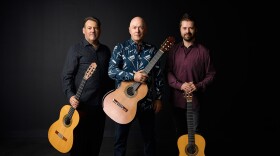UNLV film students — and you! — get an insider’s look at Hollywood’s creative, marketing, and business worlds
Actor and UNLV film and theater professor Clarence Gilyard — you know him as Theo, the “quarterback is toast!” terrorist from Die Hard — reprises his role in this year’s surprise Die Hard sequel: a long, splashy, Super Bowl-style commercial from Advanced Auto Parts celebrating its acquisition of the Die Hard battery brand. Gilyard’s character, the only bad guy in the movie who didn’t die, is back, once again menacing Bruce Willis’ John McClane (Argyle, too!), who only wants to change his dead battery. Gunfire and explosions ensue. Millions have watched.
Because he’s a professor, Gilyard is leveraging the experience to benefit his students — and anyone else who wants to Zoom in. He arranged for the commercial’s director, producer, and cinematographer, plus the marketing team and suits from Advanced Auto Parts, to spend a couple hours taking their audience through the creative, marketing, and business processes behind the production. Taking place on Friday, December 4, at 1:30 p.m., it’s free and open to the public. Just email unlvfilm@unlv.edu for the Zoom link.
We dropped a few questions on the affable and thoughtful Gilyard, who was in Utah, where he is the associate director of the Kayenta Center for the Arts, as well as associate director of SimonFest Theatre Company.
What was it like to return to the milieu of what’s now considered a movie classic?
A Christmas film, no less! (Laughs.) Don’t show this to my wife — she’s a serious Catholic woman. (Again with the laughing.)
Anyway. So I get the call, and because I’ve unplugged from mainstream Hollywood to straighten out my life as a mature person, it was surreal. I kind of didn’t believe it. And especially when they made me an offer I couldn’t refuse. In a sense, the script, they couldn’t do it without me. But I’m making a strategic move back to Hollywood with some projects, so I had to think about it. And then, when I realized what it was, which was a Super Bowl-sized campaign to surprise the audience into thinking a new Die Hard movie was coming out, I said, Well, I gotta do this. And it still is surreal!
And now you’re leveraging that experience to help UNLV film students.
Because I’m this nontraditional academic professional, I thought, This is why the university hired me — to bring this kind of thing in. So I called John (Suits), the director, and I called the VP of Advanced, and they were onboard. Which is really good that people are generous enough. For them to open up to a university, under these circumstances, with these students, to let them know that people care about their futures when they’re up in the air about their futures. These students are trying to keep it together, but they are anxious and dealing with depression, with fear. They’re really dealing with these things; I talk to them every day.
For my students, they’re realizing that they have to mobilize the integrated, holistic self during this. In the beginning, there was such depression. I was able to get the students onboard, but there were a few who would still be in bed, with a hood over their head and a blanket up to their neck. So I had to figure out how to get them up, get them out. And continue to discuss where they were in (class) and remind them of the terrain, and the circumstances. Once you identify the enemy, now you have hope because you have something to fight against. You have to enter the battle. And that is continuing to develop the aesthetic techniques of acting, and continuing to do that under the circumstances.
When you look back on Die Hard, what do you think of your younger self in that role?
So, I had ducked out of Hollywood for a long weekend; I went down with a friend to Laguna. I came back on a Sunday evening, and I went to bed. I got up to use the bathroom, and the flicker was going on on my answering machine. So I pressed the button while I was in the bathroom, and I hear my agent going through this litany of calls. “Clarence, give me a call.” “Clarence, when you get this message, give me a call.” “Clarence, where are you?” “Clarence, give me a call.” “Clarence where the hell are you?” It just escalated.
So it’s literally 11 o’clock at night, and I call my agent, who says, “Get off the phone, go take a shower, I’m going to make a call.” So I patted my Afro down, I put on my best “I’m a star” outfit, I’m walking in for a meeting. And my agent sends me to the 20th Century Fox backlot. And they say, go to that building over there that’s under construction. It’s in Century City. The Nakatomi building; the top two floors hadn’t been completed. So I went up to the 33rd floor, and a production assistant stopped me and asked, “Who are you looking for?” I said, “The executive producer and the director are looking for me.”
So Joel Silver walks over to me. He says, “Clarence! I admire your work. I was just watching you the other day in Top Gun. And we’ve been trying to cast this part. What’re you up to?”
I’m like, Is this happening? I said, “I just got back from Laguna, I’m really not doing anything. I’m just kind of looking for things.” He says, “I want to offer you this part. I said, what the movie about? He said, “Well, it’s about these terrorists. I want you to play this terrorist.”
I’m like, Wow, a terrorist! Which is so far outside the box for a young African-American, you know what I mean, to be offered this. It’s like midnight now. They’d been looking for me. This is like out of a dream!
I didn’t even meet John McTiernan that night, because he was busy. Bruce was over at the window, looking out. Demi’s over there. So now I’m kinda standing around in this dark room that they’re setting up for this shot. I go, I gotta go talk to somebody, I gotta share this with somebody. So I whipped down the elevator and got back in my car. I went to Cantor’s, which is a very important Jewish deli. But it was closed; I got there too late to sit in a booth at Cantor’s. Schwab’s was too far away. But across the street was a little Chinese place. So I went in there, and I sat in the booth. Do I want to eat, who do I call? And I realized I was alone. There was a pay phone right outside, so I go out and call my friend in Canada. And I said, “I just made a huge salary, dude! And I didn’t doanything, but the movie before got me this movie.”
So this is a testament to the work that I’d put in before. And you have to be ready.
Every season the argument is renewed: Is Die Hard a Christmas movie? Care to weigh in?
You go online, “Top Five Christmas Movies” — I think it’s number three now. People swear, “Gotta watch Die Hardon Christmas.” I am so proud of that. I mean, I understand the reason for the season. But it just tickles me. I go, Honey, look! (Laughs.)










